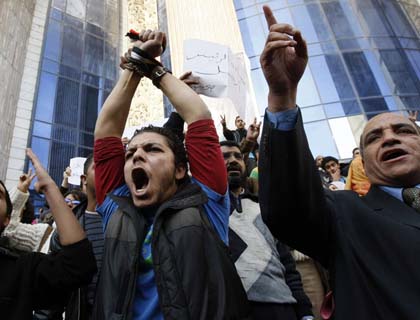Looking deeply into the current situation of Egypt, the largest populous state in the Arab world and the mostly-viewed driver of democracy in the future, sorry to utter, makes me to go for a “fresh phrase” to interpret the stormy civil uprising in Arab countries instead of previous “Arab Spring”. Though from the very start, many were expressing concern over the likely bogged-down of the so-called “youth and virtual world” revolution in the marsh before people taste the flavor of democracy, ostensibly even that account, branding the civil movement as Spring was too credulous, if not a mistake. The fall of Moammar Gaddafi, the president who changed a nomadic-structured Libyan society in to one of the strong nation in
Africa, raised per capita income and set his country on the track bound to modernity and industrialization, has brought no fortune for Libyans. Instead the dissemination and traffic of government’s arms would be a detrimental danger to week African countries like that of Mali in addition to thousands of people killed as result of months-long military struggle between Libyan regime and western-armed opposition backed by relentless western airstrikes.
According to reports from Tunisia, people are not happy with the revolution there too. People suffering from depression and other psychological problem have increased tremendously. Similar movements in Bahrian and Saudi Arabia yielded no fruits except the crackdown of protestors by authoritarian regime that encountered no global reprimand for their irresponsible acts.
Watching the tragedy in Syria, innocent Syrians may regret why they ever held protest. More than sixty thousand people killed during 22-month long uprising, hundreds of thousands of people fled the country and thousands of mothers and fathers are eyewitness to the death of their sons and daughters in subzero weather. Syria, one the strong Arab nation, now its people depends on the ration of charity organizations. For what? Perhaps, the answer is for democracy and economic prosperity. Can anybody tell me what democracy and economic prosperity?
The society where people of different religious and communal background used to live peacefully together has turned into Hollywood of horror movies. But the context of these movies is different. These movies are real and everyone in the film is heroes and heroines. They are not there to play a role but be the role. A relative plural society now has changed into stage for sectarian purge. People are persecuted, tortured and killed merely due to their religious believes.
The political prospective does not promise a better future too.. Al-Nusra militant group fearlessly claim that it is after establishment of an Islamic government. For them, the uprising was never for bringing democracy but topple of a regime on account of the religious believe of its rulers. The ongoing struggle has also smashed the economic infrastructure. It cost the nation billions of dollars. Hundreds of thousands of people lost jobs and have no source to feed their families instead dazed on not much expected global charity organizations.
The Aleppo, the economic capital of the country does not bear any similarity to a booming city instead symbolizes and old wracked and dejected city in history books. Pilgrims and tourists who were profitable source of income for government have completely stopped. Even if the security situation restores, the historical Aleppo would not attract its previous visitors because the monuments have also shattered down. Regional countries who pour cash to end the government may not be that generous once the goal achieved. So, from all angles, the nation seems doomed.
So, with above turmoil and bloodshed, can anybody persist on terming civil uprising in Syria as “Syrian Spring”? If someone does, I do not. I think, it is far realistic to brand the Syrian uprising as “the harshest winter” that Syrians could imagine in its political history. As I mentioned, the Egypt which was viewed to change into a driver of democracy in the region is now bogged down in an unending crisis.
Strewn tires and burnt vehicles have become an integral part of opposition to Islamist government. Last week President Mursi was compelled to enforce emergency state in Port Said and two neighboring cities to restore normalcy. But people broke the declaration and clashed with security forces.
The Flure-up was caused by sentencing 21 prisoners of Port Said who were found guilty in the last year’shorrific football incident which left 80 people dead. The capital punishment was aimed to bring justice to families of victims, but unfortunately the violent protest took the lives of 60 people, the most violent protest since the shot of Muslim Brotherhood into power after its 60 years of struggle with the ruling regimes.
No matter, how the government to restore the situation, but skirmish goes on and protestors call for resign of President Mursi. The throwing stones protestors clashed with security forces firing tear gas and water cannons at the presidential palace in Cairo on Friday. Protests were held in cities around the country on Friday after a call for rallies by opponents of Islamist President Mohammed Mursi. But some cracks appeared in the ranks of the opposition as some sharply criticized its political leaders for holding their first meeting with the rival Muslim Brotherhood a day earlier.
Around 6,000 protesters massed outside Mursi’s presidential palace in an upscale district of the capital, banging on the gates and throwing stones and shoes into the grounds in a show of contempt. At least one firebomb was thrown through the gates as crowds chanted, “Leave, leave,” addressing Mursi.
However, the opposition political parties have role in the protest, but no one should forget that the part of the demonstrators have no political affiliation to existing political parties. Rather they are angry with the growing economic problem which needs time and long-term effective policy. So, it means, for the time, Arab countries should never expect economic fruit from their spring.

